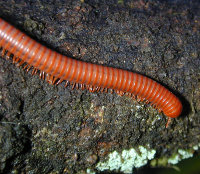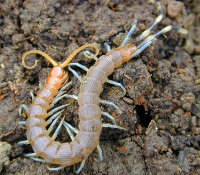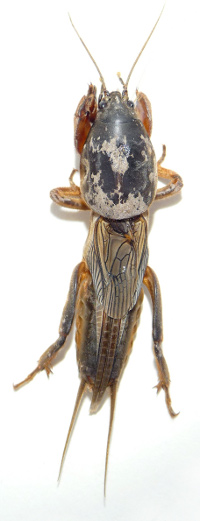Categories: "Animals"
Сороконожка
I have never had this conversation in Russian, but I can imagine having it:
| — Боря, как перевести на русский «centipede»? | “Boris, how do you translate ‘centipede’ into Russian?” |
| — «Сороконожка». | “‘Сороконожка.’” |
| — А «millipede»? | “And what about ‘millipede’?” |
| — Тоже «Сороконожка». | “That's also ‘Сороконожка.’” |
| — Правда? Как русские их отличают друга от друга? | “Really? How do Russians distinguish the one from the other?” |
| — Разве их нужно отличaть? | “Do you really need to tell them apart?” |
| — Ещё бы! «Centipedes» больно кусаются, а «millipedes» не кусаются вообще. | “And how! Centipedes have a painful bite, and millipedes don't bite at all.” |
Being from the crazy American West where little ol’ ladies own pistols and any self-respecting plant has thorns and a self-respecting river should be dry, I seem to have always known the words centipede and millipede. The difference is vital. A millipede you can drop down the back of your friend's blouse, and she'll squirm and shout and hate you for a week, but she won't go to the hospital. If you drop a centipede down the back of your friend's blouse, the centipede will bite like crazy, and she will want to go to the hospital and will hate you forever.
The stem сорок- means forty. The stem нож- means leg/foot, and the -ка suffix makes it a noun. Thus сороконожка literally means forty-footer. Cool, huh? Russians apply the word to any creepy-crawly that has a whole bunch of legs. There's a more bookish word that has the same meaning, which is многоножка, which means many-footer. We have a calque of that word in English, myriapod, but I've only heard entomologists use it. Certainly ordinary people in the US don't know that word. There is another word, сколопендра (borrowed from Latin scolopendra) which means centipede exclusively. Here are some sample sentences:
| Многоножки De Blainville — сапрофаги, питающиеся в почве растительными остатками (Russian Wikipedia) | The De Blainville millipedes are saprophagous, feeding on plant remains in the soil. |
| Известны случаи нападения гигантской сколопендры на птиц, ящериц и жаб. (Russian Wikipedia) | Giant centipedes have been known to attack birds, lizards and toads. |
| В Крыму есть популяции только самок сколопендр, они размножаются партеногенетически, без участия самцов. (source) | In the Crimea there are centipede populations that are exclusively female; they reproduce parthenogenetically, without the help of males. |
| Эта сороконожка не кусается. Она — твой друг. |
Эта сороконожка кусается. Она — не твой друг. |
 |
 |
| Photo courtesy of Wikipedia | Photo courtesy of Wikipedia |
Ёж
One common pet in Russia is the ёж or ёжик, which means hedgehog. Bear in mind that most Russians live in apartments, so small pets are eminently sensible. This little cutie was found in the region of Astrakhan:
The noun is an end-stressed noun, which means that when it has a grammatical ending, the stress shows up on the first syllable of the grammatical ending:
| Sg | Pl | |
| Nom | ёж | ежи |
| Acc | ежа | ежей |
| Gen | ежа | ежей |
| Pre | еже | ежах |
| Dat | ежу | ежам |
| Ins | ежом | ежами |
Americans aren't particularly well acquainted with hedgehogs, so here are a couple of remedial facts from Russian Wikipedia:
| Ёж — общеизвестный по внешности зверёк, чья спина и бока покрыты короткими тёмными иглами. | A hedgehog is a small animal of well-known appearance whose back and sides are covered with short dark spines. |
| Иногда ежи накалывают на иглы даже недокуренные сигареты. Причина этого поведения до сих пор не ясна. | Sometimes hedgehogs even spear half-smoked cigarettes on their spines. The function of this behavior is currently unclear. |
The animal is also used in the expression «Это и ежу понятно!» “Everybody knows that!” (Literally, “this even to a hedgehog is comprehensible.”) Those types of emotionally colored statements are often best translated with idiomatic equivalents instead of trying for a word for word translation. Sample sentences:
| — Американское вторжение в Ирак было ужасной ошибкой. — Это и ежу понятно. |
“The American invasion of Iraq was a terrible mistake.” “Tell me something I didn't know.” |
| — Я уже пропил свою зарплату. Наверно, сегодня я не должен пить. — Ну, это и ежу поятно. |
“I've already drunk my paycheck away. I probably shouldn't drink today.” “Well, that's a no-brainer.” |
And of course we can't talk about such an adorable little animal without sharing at least one pet owner's video of a hedgehog eating… um… actually, I can't figure out what the heck it's eating, but it's still adorable.
Жаворонок, сова
In English we have several words for a person who likes to go to bed early and get up early: morning person, early riser, early bird. People who like to go to bed late and get up late are night people or night owls. If you go to a Russian dating service like http://russianwives4u.net or http://russianstuds4u.net (not that I myself have ever been to such a site), you may find that you have to specify whether you are an early bird or a night owl. The Russian equivalent of an early bird is жаворонок, literally a skylark, and the Russian equivalent of a night owl is сова, literally an owl. So you can fill out those parts of your dating profile like this:
|
Режим дня ☐ Я — сова.
☑ Я — жаворонок. |
Daily routine ☐ I'm a night owl.
☑ I'm an early bird. |
Медведка

Wikimedia commons
I guess the world of insects is not well known to широким слоям населения the general public ![]() , unless you are a biologist or smth. Myself I got a little exposure to the insect world when I visited my Ukrainian great-grandmother during my childhood. There, I got acquainted with creatures like божья коровка (lit., God's little cow), жуки-солдатики (lit., little soldier beetles), колорадский жук (lit., Colorado beetle), and the most interesting one, медведка, which literally means “little bear thing” but in English is translated as mole cricket. My great grandmother had a big orchard and garden and a big potato field, I used to help her tend the land. To rid the potato bushes of the насекомое-вредитель “insect pest” колорадский жук “Colorado potato beetle” (which we threw in jars with kerosene). Sometimes we saw a nasty creature that looked like a black crawfish coming out from their земляных норок burrows, and that юрко проползало между картофельных кустов scrambled nimbly amidst the potato plants. Seeing them always gave me a nasty feeling. My grandmother usually перерубала их мотыжкой или тяпкой chopped them in two with a hoe or hand rake. it seemed to be the only way to kill them.
, unless you are a biologist or smth. Myself I got a little exposure to the insect world when I visited my Ukrainian great-grandmother during my childhood. There, I got acquainted with creatures like божья коровка (lit., God's little cow), жуки-солдатики (lit., little soldier beetles), колорадский жук (lit., Colorado beetle), and the most interesting one, медведка, which literally means “little bear thing” but in English is translated as mole cricket. My great grandmother had a big orchard and garden and a big potato field, I used to help her tend the land. To rid the potato bushes of the насекомое-вредитель “insect pest” колорадский жук “Colorado potato beetle” (which we threw in jars with kerosene). Sometimes we saw a nasty creature that looked like a black crawfish coming out from their земляных норок burrows, and that юрко проползало между картофельных кустов scrambled nimbly amidst the potato plants. Seeing them always gave me a nasty feeling. My grandmother usually перерубала их мотыжкой или тяпкой chopped them in two with a hoe or hand rake. it seemed to be the only way to kill them.
Медведки - dangerous creatures, they harm клубни картофеля potato tubers и другие корнеплоды and other root vegetables. They eat them up underground, and if there is a colony of медведок, they can consume the whole potato crop, leaving people without their food supply for the winter. If there is a conventional way to destroy their colonies - I don't know it. Do you? I am wondering if медведки exist in the US? Or are American potatoes safe? ![]()
Jan. 12, 2011, Don adds: here's a video that will really give you a good idea of just how gross those медведки are. The video is from antclub.ru.
Кинология
One interesting word in Russian is кинология. The -логия ending corresponds to -logy in English and means "the study of." Every first semester Russian student knows that кино means the movies, so one could be forgiven if one thought that the word meant "film studies." Wrong! Кинология is the study of dogs and how to breed and care for them. The stem is borrowed from the Greek root cyn- which means dog. (The cee in Greek stems was always pronounced like the hard cee in cat, which is why it is represented by к in Russian. Nowadays in English we pronounce it with an ess sound, which misrepresents the original pronunciation.) We have a similar word in English, cynology, but it is uncommon.
We have another word in English that also derives from that stem, which is Cynic. The Cynics were a group of philosophers who rejected material wealth and social conventions. The most famous of them was Diogenes, who is often pictured as carrying a lamp around the earth looking for an honest man. Since they lived on the streets without homes or possessions like dogs, they were called Cynics κυνικόι, which means “doglike ones.”
